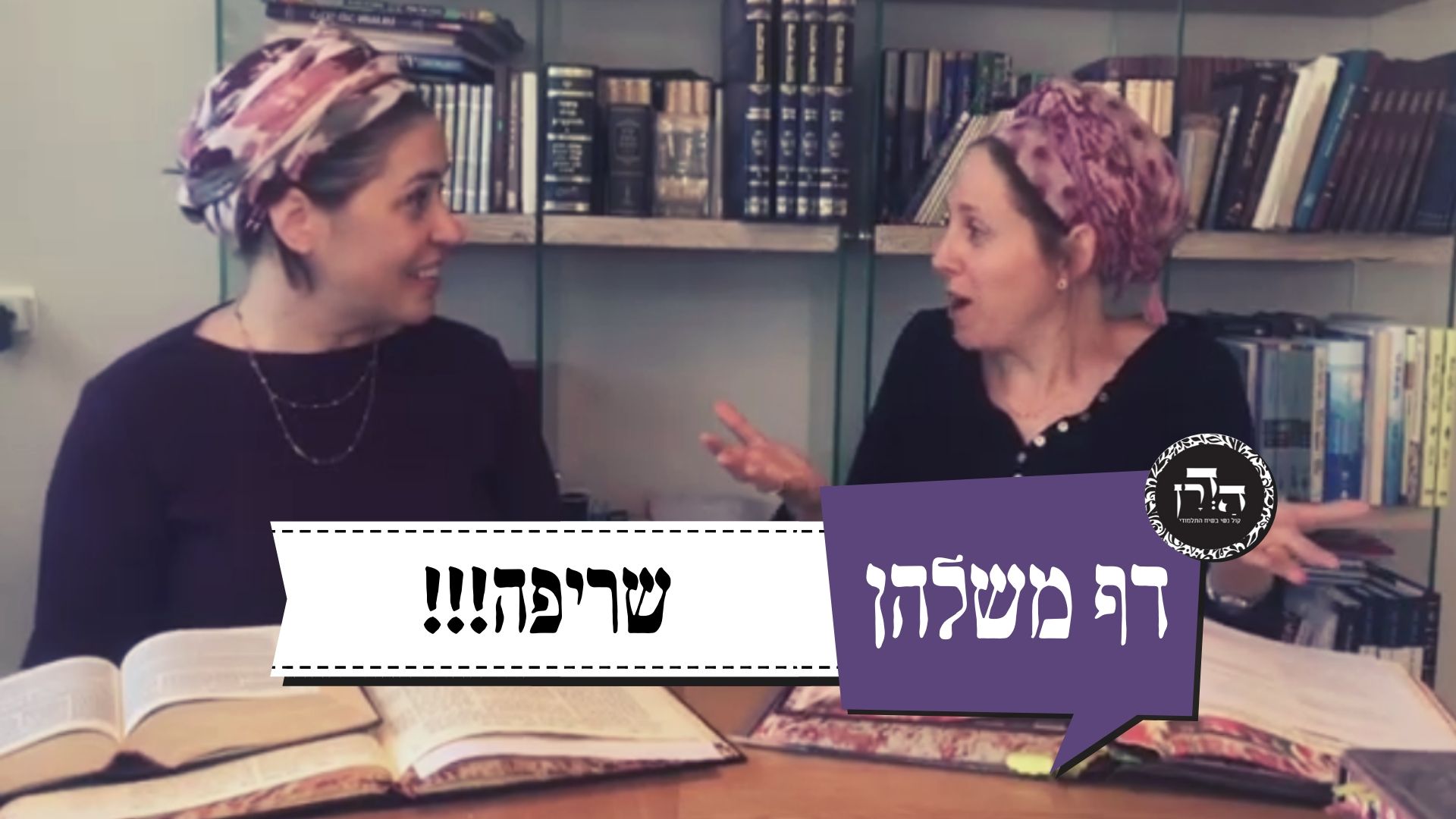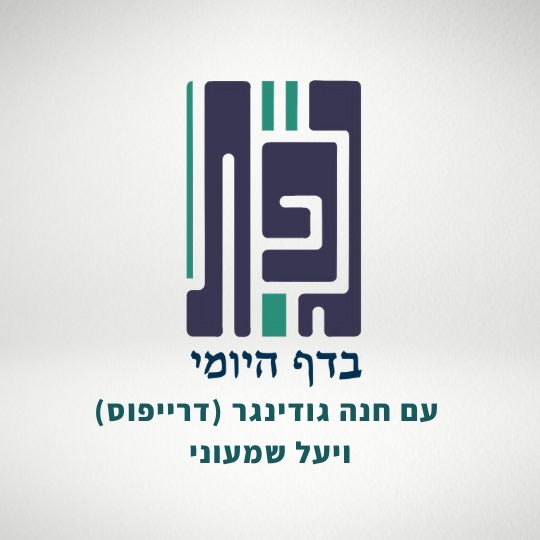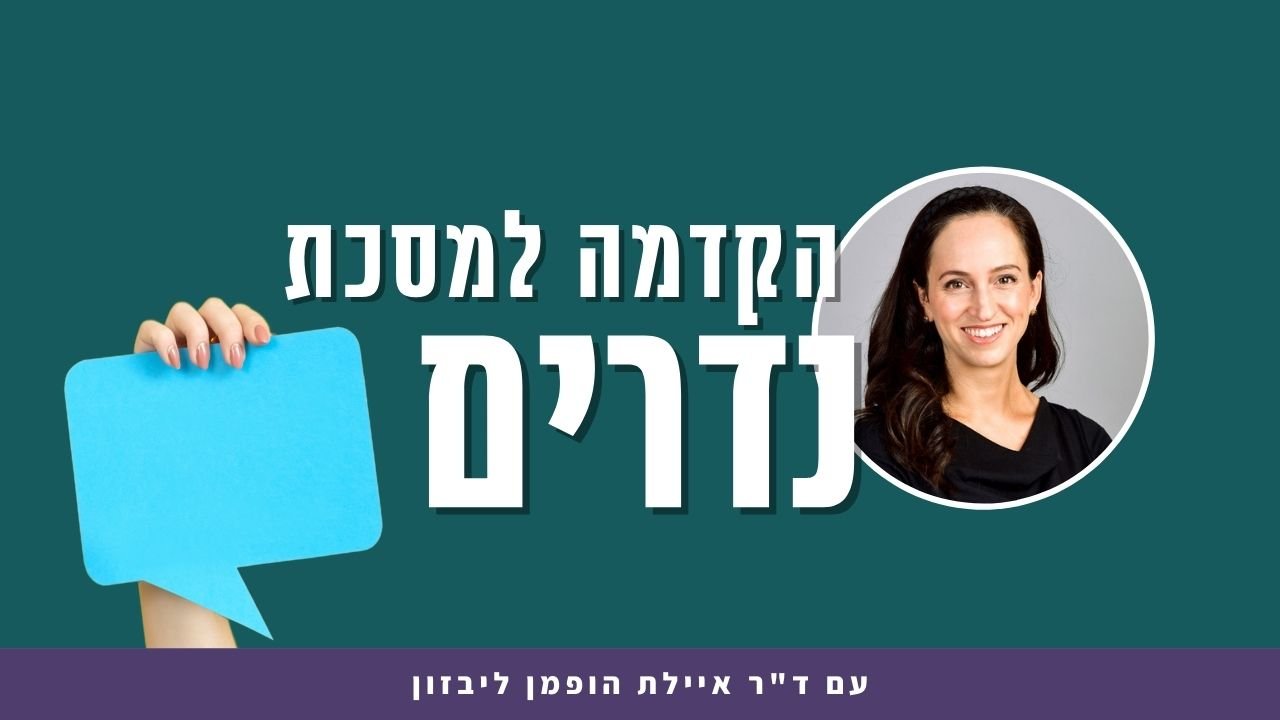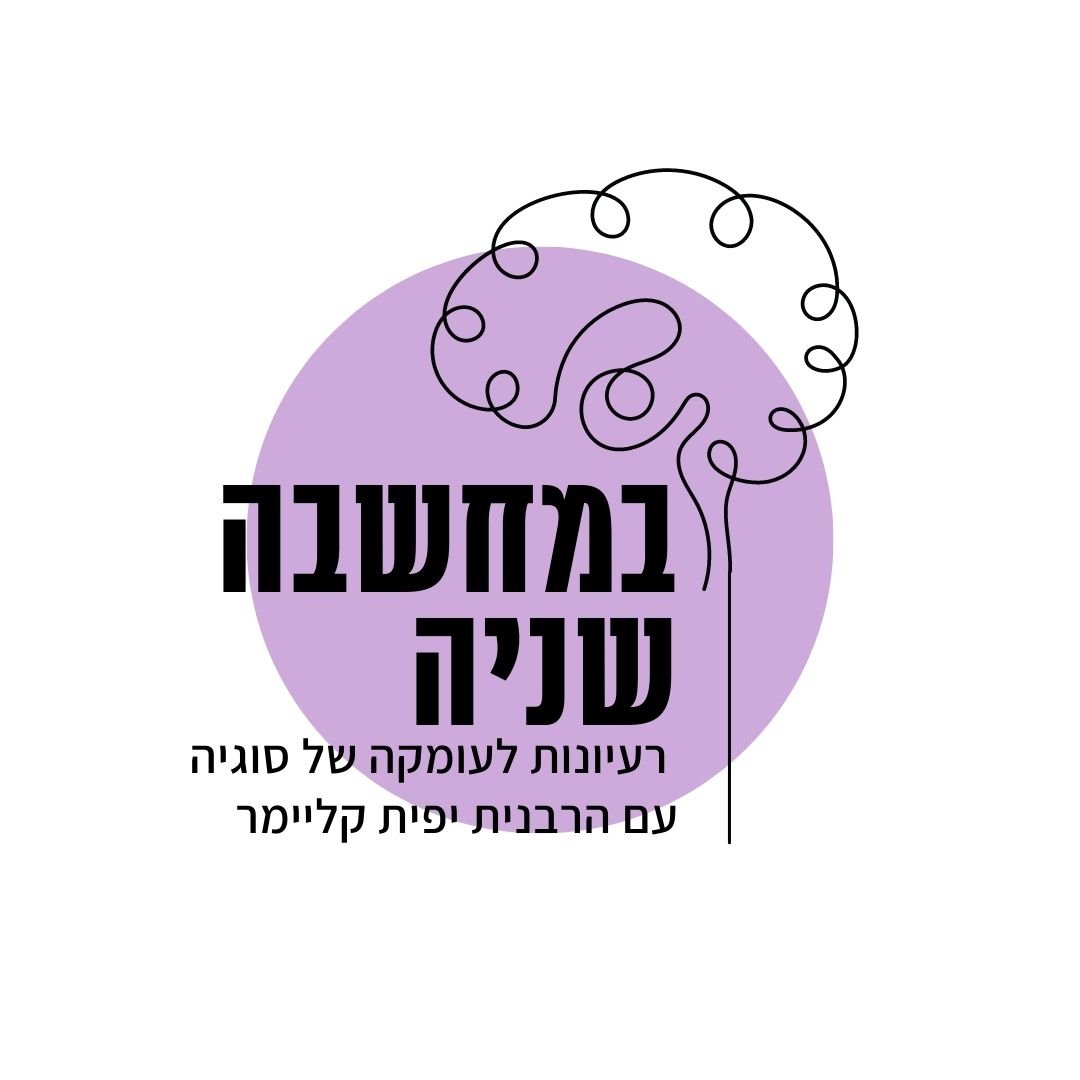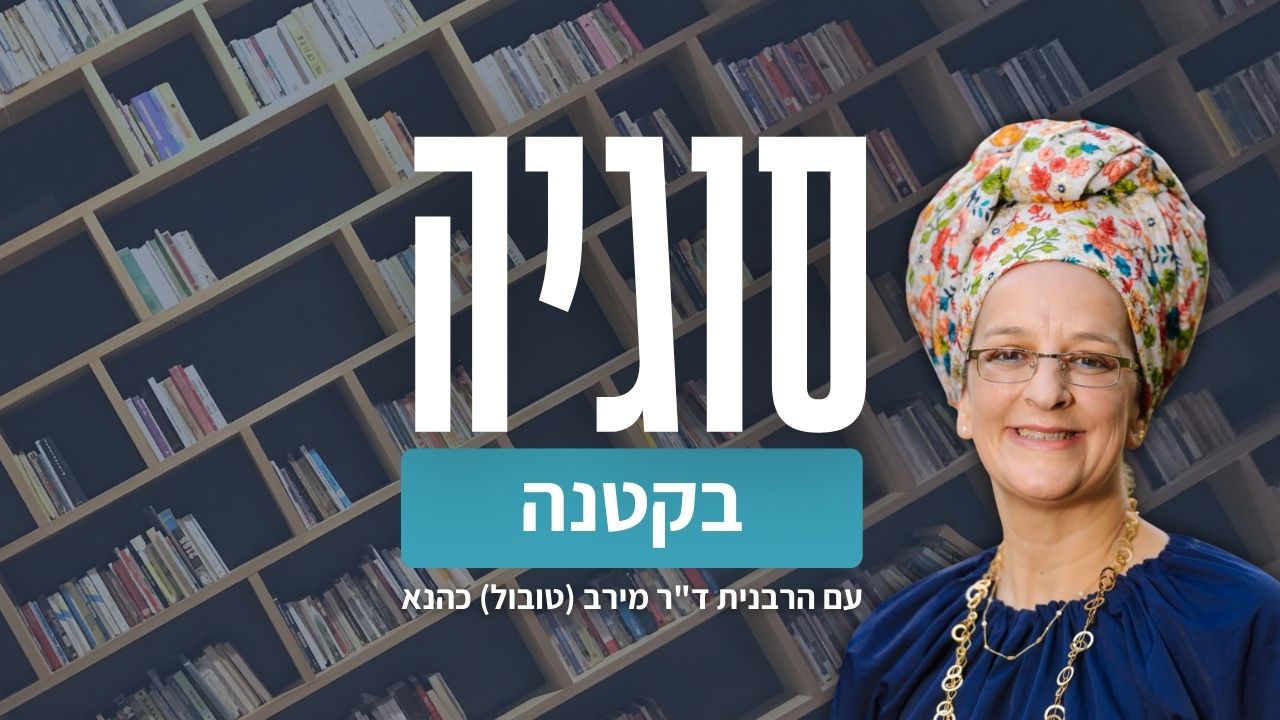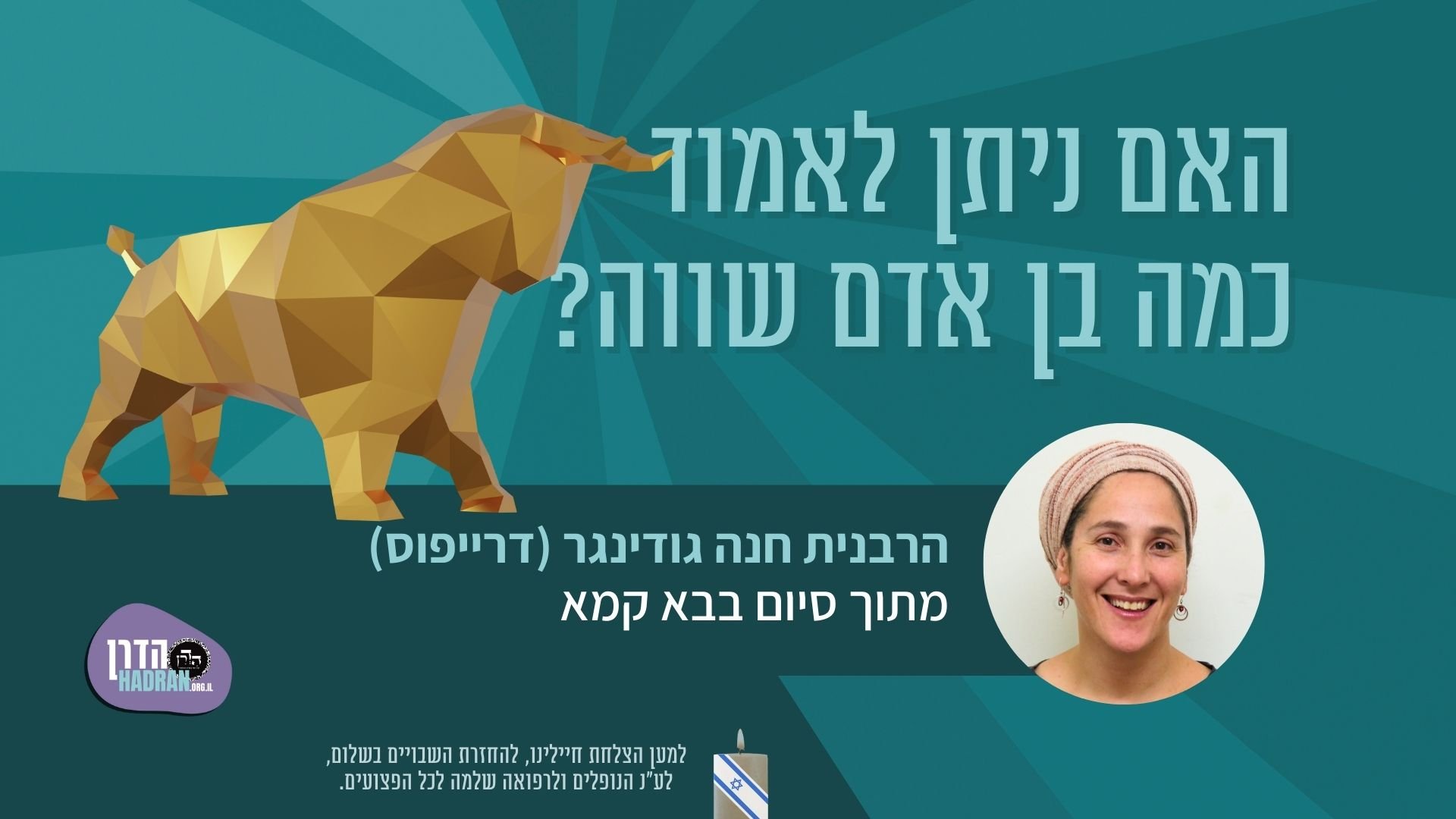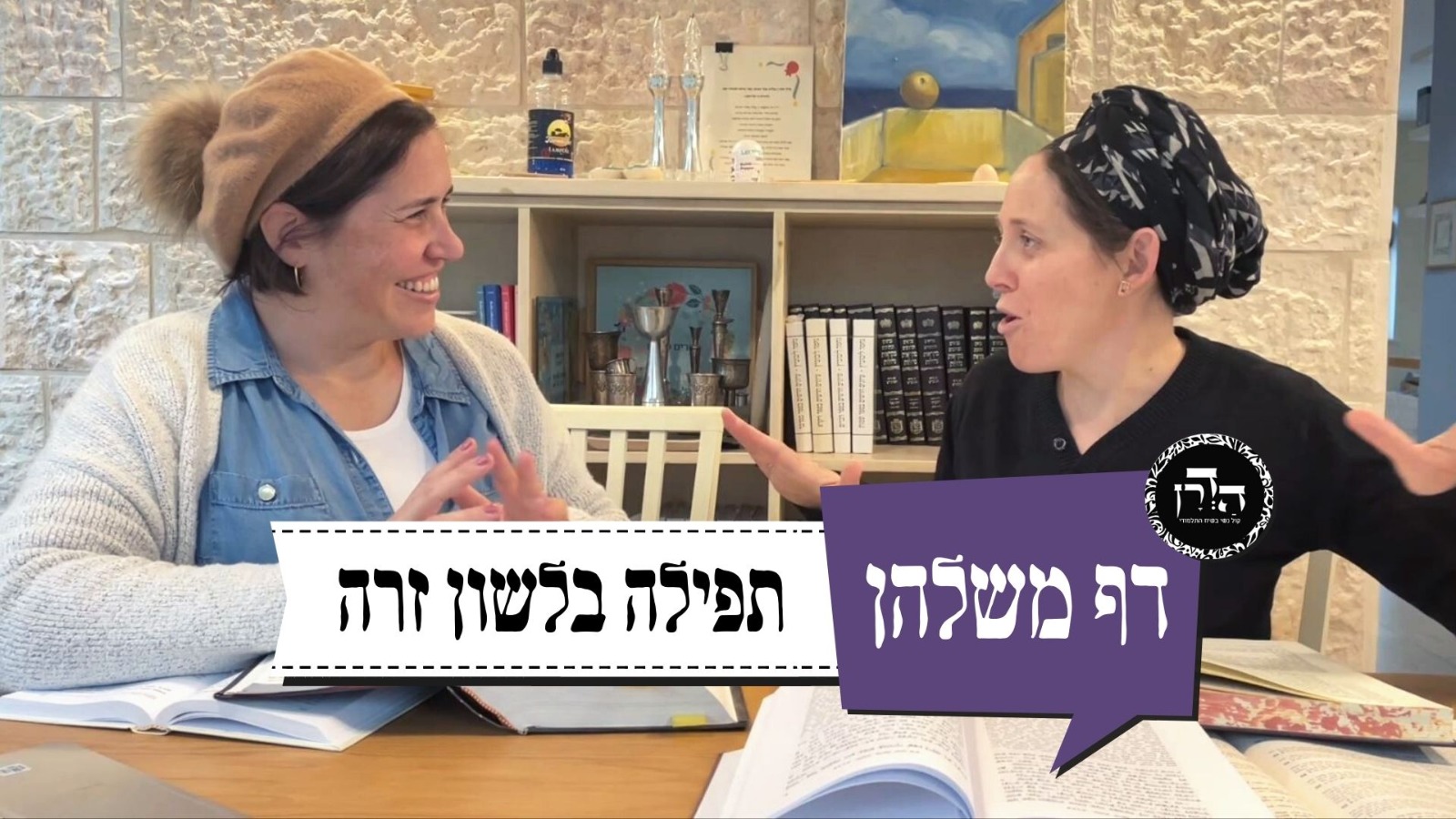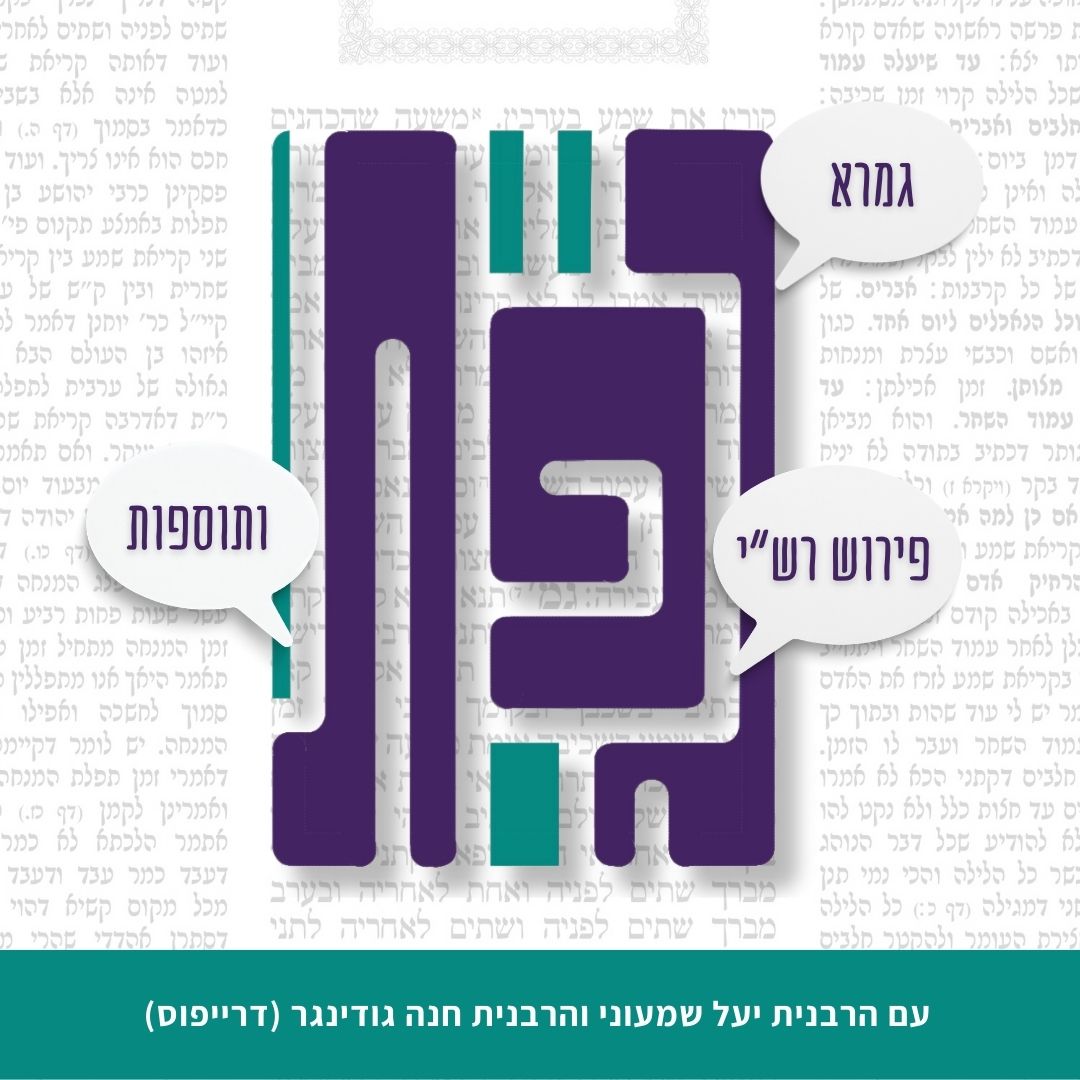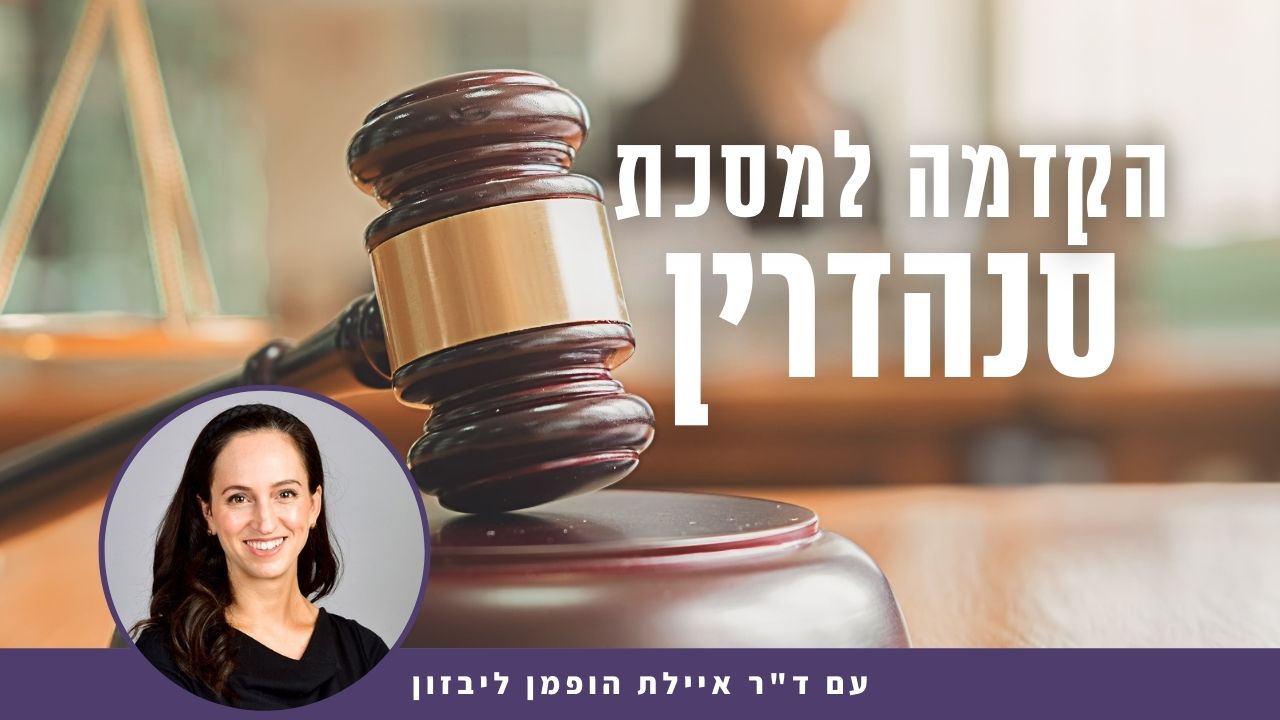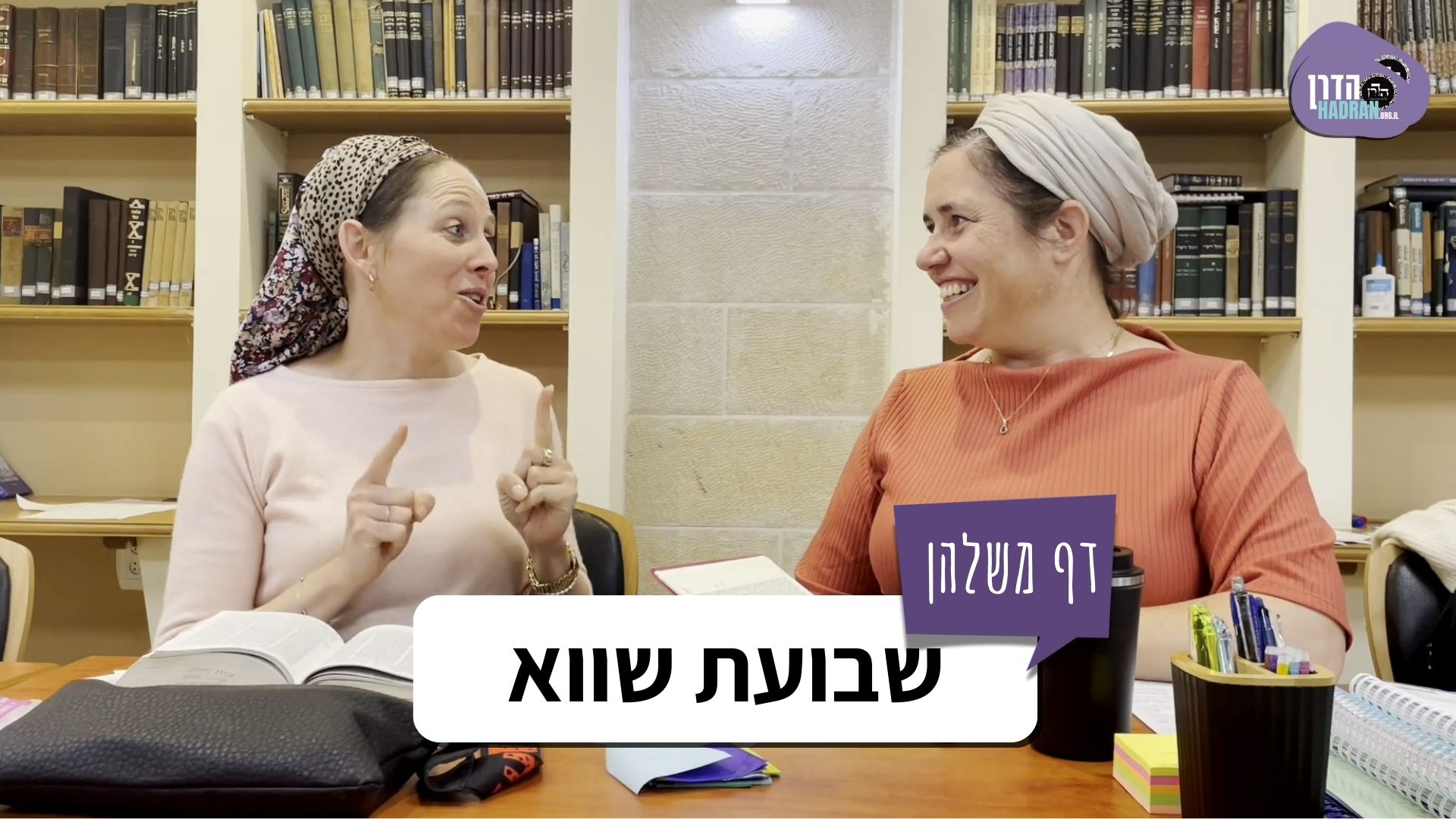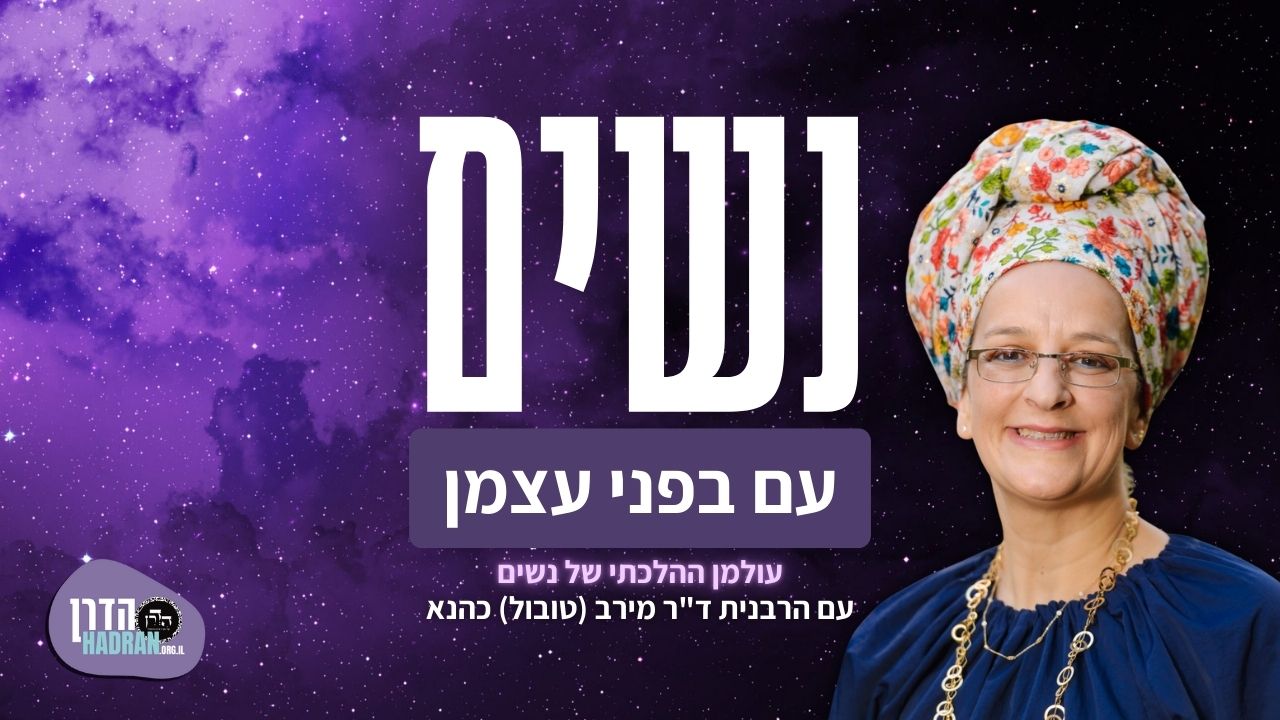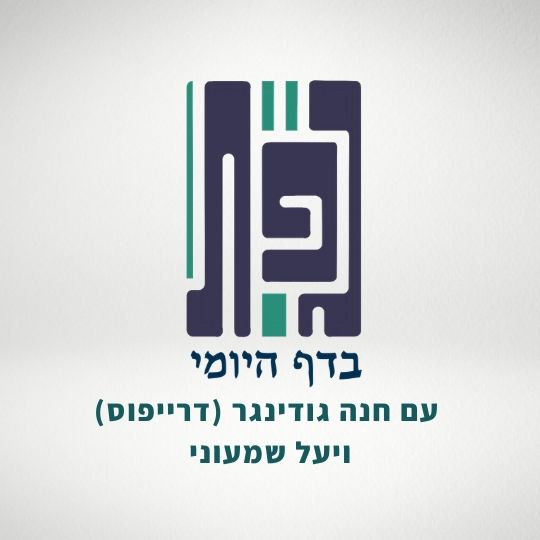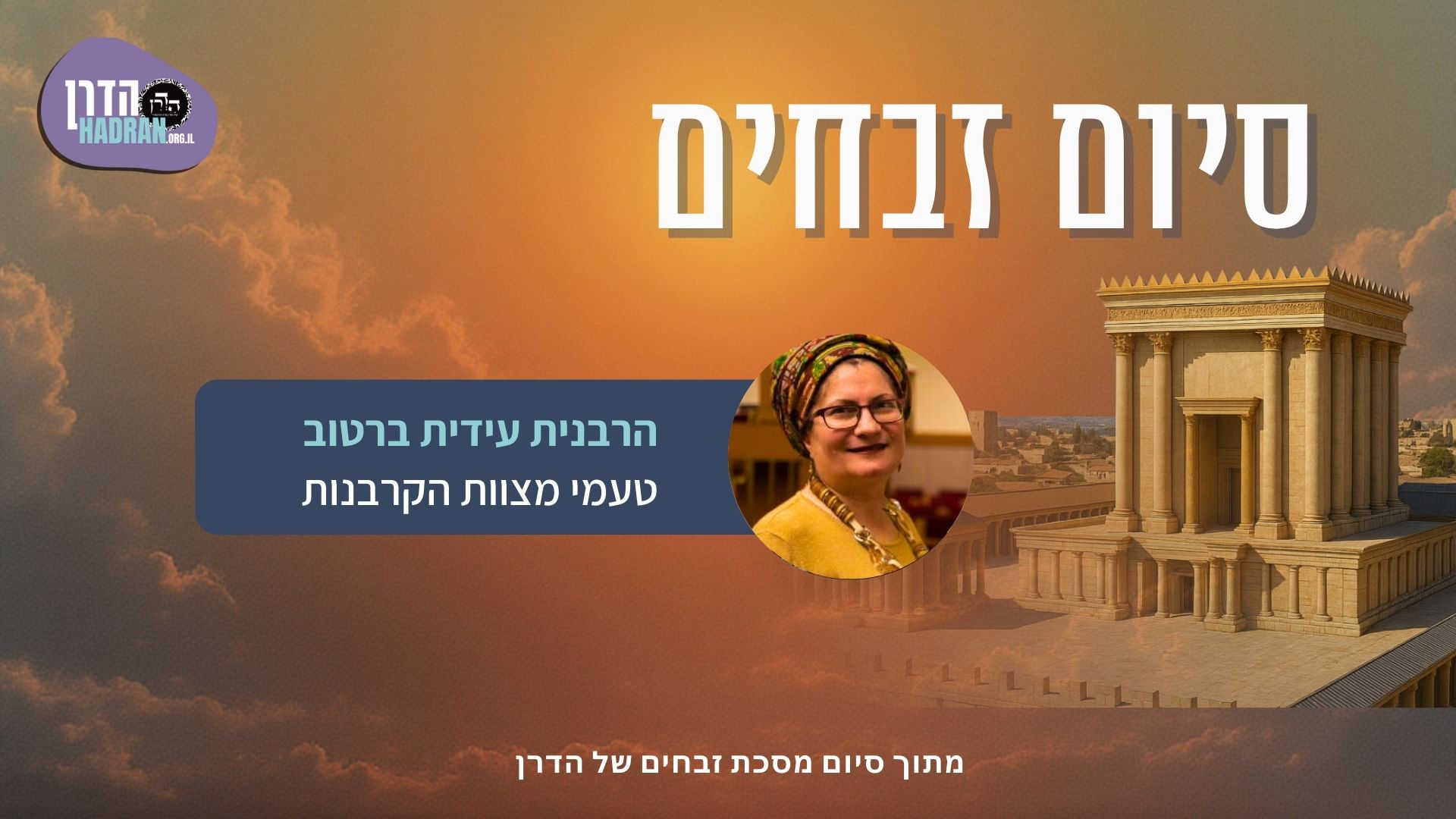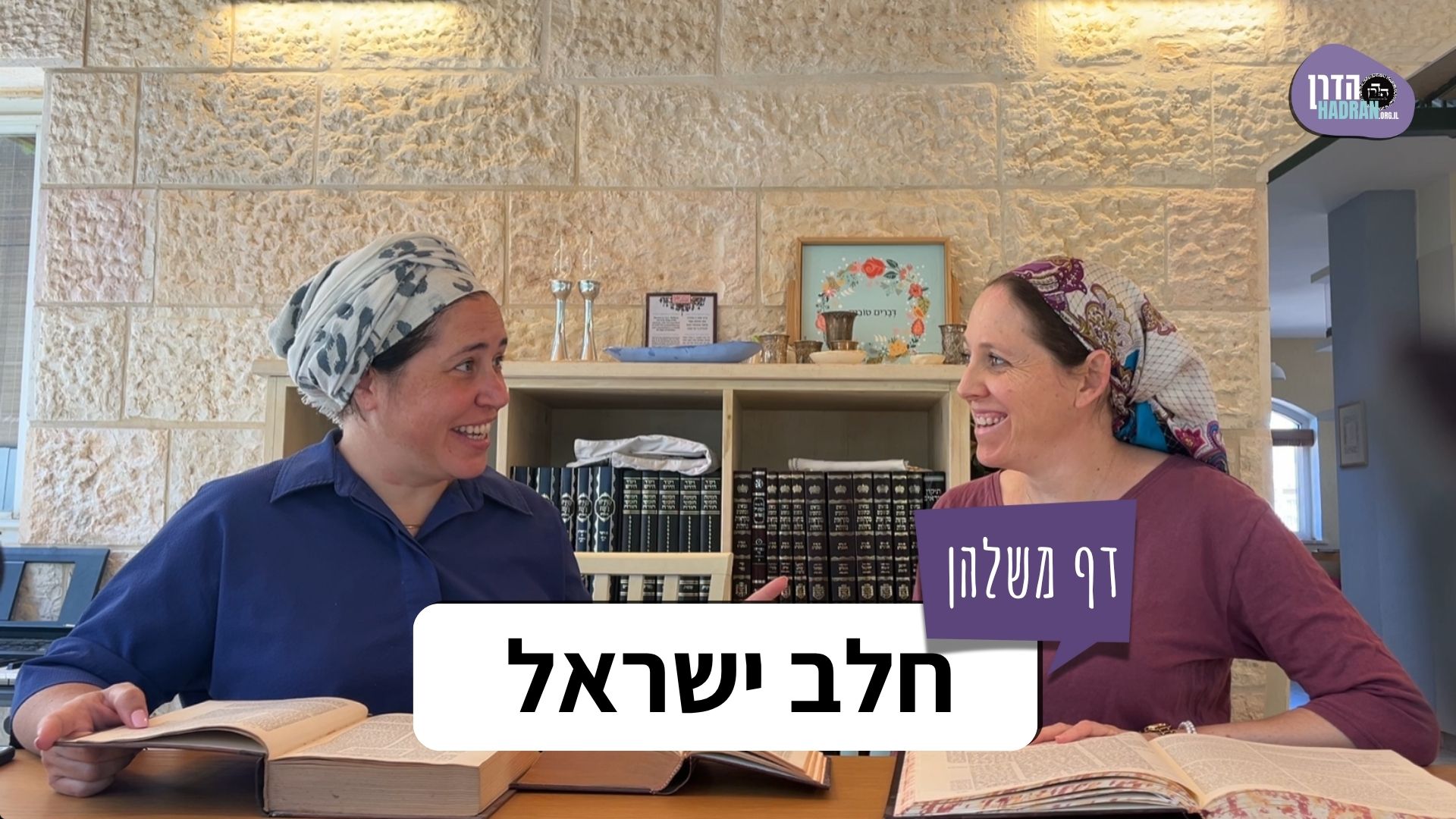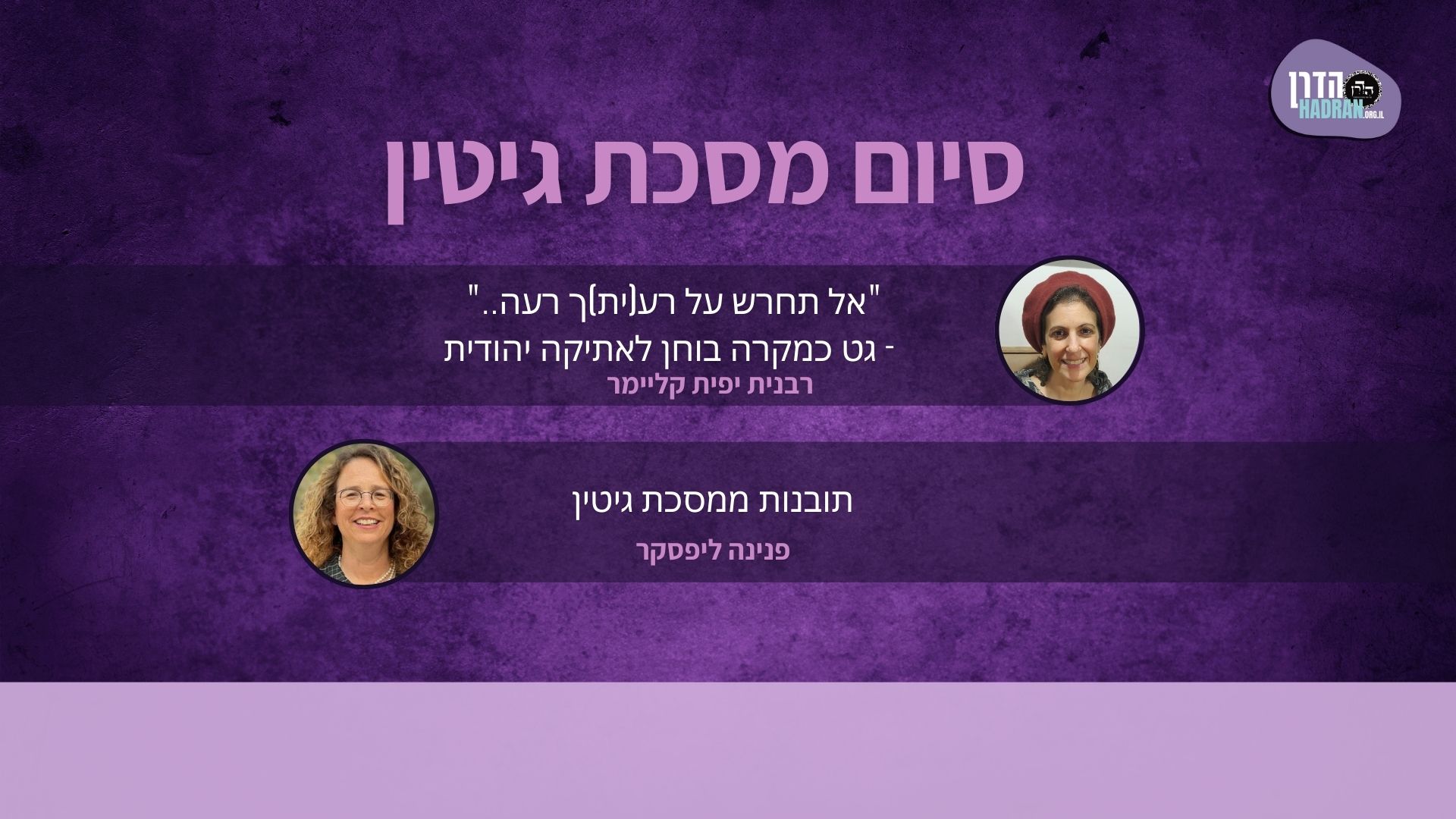איזה חלקים של הבהמה אסורים משום חלב ואיזה משום דם? האם יש נאמנות לטבחים בעניין גיד הנשה וחלב?
הלימוד השבוע מוקדש לזכות ולשלום הַיְימׇנוֹט אֱמוּנָה בַּת באנצ’י (קָסָאוּ) בת 11 שנעלמה במקום מגוריה בצפת, לפני שנתיים, ביום ט”ז אדר תשפ”ד (25.2.24), ולא נודעו עקבותיה.
הלימוד השבוע מוקדש למען ביטחון המדינה, החיילים והאזרחים, ולמען חירותו של העם האיראני. שנזכה בקרוב שיתקיים בנו הפסוק: "לַיְּהוּדִים הָיְתָה אוֹרָה וְשִׂמְחָה וְשָׂשֹׂן וִיקָר”.
רוצה להקדיש שיעור?

כלים
הלימוד השבוע מוקדש לזכות ולשלום הַיְימׇנוֹט אֱמוּנָה בַּת באנצ’י (קָסָאוּ) בת 11 שנעלמה במקום מגוריה בצפת, לפני שנתיים, ביום ט”ז אדר תשפ”ד (25.2.24), ולא נודעו עקבותיה.
הלימוד השבוע מוקדש למען ביטחון המדינה, החיילים והאזרחים, ולמען חירותו של העם האיראני. שנזכה בקרוב שיתקיים בנו הפסוק: "לַיְּהוּדִים הָיְתָה אוֹרָה וְשִׂמְחָה וְשָׂשֹׂן וִיקָר”.
כלים
העמקה
רוצה להבין מה באמת קורה מתחת לפני השטח של הסוגיה?
שיעורים, פודקאסטים והרחבות של מיטב המורות שלנו יפתחו לך עוד זוויות וכיווני חשיבה.
חדשה בלימוד הגמרא?
זה הדף הראשון שלך? איזו התרגשות עצומה! יש לנו בדיוק את התכנים והכלים שיעזרו לך לעשות את הצעדים הראשונים ללמידה בקצב וברמה שלך, כך תוכלי להרגיש בנוח גם בתוך הסוגיות המורכבות ומאתגרות.
פסיפס הלומדות שלנו
גלי את קהילת הלומדות שלנו, מגוון נשים, רקעים וסיפורים. כולן חלק מתנועה ומסע מרגש ועוצמתי.
חולין צג
חֵלֶב שֶׁהַבָּשָׂר חוֹפֶה אוֹתוֹ מוּתָּר, אַלְמָא שֶׁעַל הַכְּסָלִים אָמַר רַחֲמָנָא וְלֹא שֶׁבְּתוֹךְ הַכְּסָלִים, הָכָא נָמֵי שֶׁעַל הַכְּלָיוֹת אָמַר רַחֲמָנָא וְלֹא שֶׁבְּתוֹךְ הַכְּלָיוֹת.
The fat that is covered by the flesh is permitted. Apparently, when the Merciful One states in the Torah that the fat that is upon the loins is prohibited (see Leviticus 3:4), it is referring only to the fat above the loins but not the fat that is inside the loins. Here also, the Merciful One states in the Torah that the fat that is upon the kidneys is prohibited (see Leviticus 3:4), but this does not include the fat that is inside the kidneys.
גּוּפָא, אָמַר רַבִּי אַבָּא אָמַר רַב יְהוּדָה אָמַר שְׁמוּאֵל: חֵלֶב שֶׁהַבָּשָׂר חוֹפֶה אוֹתוֹ – מוּתָּר. אִינִי? וְהָאָמַר רַבִּי אַבָּא אָמַר רַב יְהוּדָה אָמַר שְׁמוּאֵל: הַאי תַּרְבָּא דְּתוּתֵי מָתְנֵי – אֲסִיר!
§ The Gemara addresses the matter itself cited in the discussion above: Rabbi Abba said that Rav Yehuda said that Shmuel said: The fat that is covered by the flesh is permitted. The Gemara asks: Is that so? But didn’t Rabbi Abba say that Rav Yehuda said that Shmuel said: This fat that is under the loins is forbidden, even though it is covered by flesh?
אָמַר אַבָּיֵי: בְּהֵמָה בְּחַיֶּיהָ פָּרוֹקֵי מִיפַּרְקָא. אָמַר רַבִּי יוֹחָנָן: אֲנָא לָאו טַבָּחָא אֲנָא וְלָאו בַּר טַבָּחָא אֲנָא, וּנְהִירְנָא דְּהָכִי הֲווֹ אָמְרִי בֵּי מִדְרְשָׁא: בְּהֵמָה בְּחַיֶּיהָ פָּרוֹקֵי מִיפַּרְקָא.
The Gemara answers that Abaye said: When an animal is alive its limbs separate at the joints as it walks, so that the fat under the loins is not covered by flesh. Therefore, even after it has been slaughtered this fat is forbidden and does not have the status of fat that is covered by flesh. Rabbi Yoḥanan said: I am not a butcher and I am not the son of a butcher, i.e., I am not expert in the anatomy of animals, but I remember that this is what they would say in the study hall: When an animal is alive its limbs separate at the joints as it walks, so that the fat under the loins is exposed.
אָמַר רַבִּי אַבָּא, אָמַר רַב יְהוּדָה, אָמַר שְׁמוּאֵל: חֵלֶב שֶׁעַל הֶמְסֵס וּבֵית הַכּוֹסוֹת (אסורין) [אָסוּר], וְעָנוּשׁ כָּרֵת, וְזֶהוּ חֵלֶב שֶׁעַל הַקֶּרֶב. אָמַר רַבִּי אַבָּא, אָמַר רַב יְהוּדָה, אָמַר שְׁמוּאֵל: הַאי תַּרְבָּא דִּקְלִיבוּסְתָּא אָסוּר, וְעָנוּשׁ כָּרֵת, וְזֶהוּ חֵלֶב שֶׁעַל הַכְּסָלִים.
§ Rabbi Abba said that Rav Yehuda said that Shmuel said: The fat that is on the omasum and the reticulum is forbidden, and its consumption is punishable by karet. And this is the fat that is referred to in the Torah as being upon the innards (see Leviticus 3:3). Rabbi Abba said that Rav Yehuda said that Shmuel said: This fat of the coccygeal bone is forbidden, and its consumption is punishable by karet. And this is the fat that is referred to in the Torah as being upon the loins (see Leviticus 3:4).
וְאָמַר רַבִּי אַבָּא, אָמַר רַב יְהוּדָה, אָמַר שְׁמוּאֵל: חוּטִין שֶׁבַּיָּד אֲסוּרִין. אָמַר רַב סָפְרָא: מֹשֶׁה, מִי אָמַר רַחֲמָנָא ״לָא תֵּיכוֹל בִּישְׂרָא״? אָמַר רָבָא: מֹשֶׁה, מִי אָמַר רַחֲמָנָא ״אֲכוֹל דְּמָא״? חַתְכֵיהּ וּמַלְחֵיהּ, אֲפִילּוּ לִקְדֵירָה נָמֵי שַׁפִּיר דָּמֵי.
And Rabbi Abba said that Rav Yehuda said that Shmuel said: The veins that are in the foreleg of an animal are forbidden. Rav Safra said to Rabbi Abba: Moses! Did the Merciful One say in the Torah: Do not eat meat? The veins of the foreleg are part of the meat and are not forbidden. Rava said: Moses! Did the Merciful One say in the Torah: Eat blood? The reason that these veins are forbidden is that they are filled with blood. Therefore, if one cuts the foreleg open and salts it to remove the blood, it is permitted even to cook it in a pot; and it is certainly permitted to roast it over a fire, which also draws out the blood.
אָמַר רַב יְהוּדָה, אָמַר שְׁמוּאֵל: רֵישׁ מְעַיָּא בְּאַמְּתָא בָּעֵי גְּרִירָה, וְזֶהוּ חֵלֶב שֶׁעַל הַדַּקִּין.
Rav Yehuda said that Shmuel said: The fat on the top cubit of the small intestine requires scraping, i.e., it is forbidden and must be removed. And this is the fat referred to by the Sages (see 49b) as the fat that is on the small intestine.
וְאָמַר רַב יְהוּדָה: חוּטִין שֶׁבָּעוֹקֶץ אֲסוּרִין. חַמְשָׁא חוּטֵי אִית בֵּיהּ בְּכַפְלָא, תְּלָתָא מִיַּמִּינָא וְתַרְתֵּי מִשְּׂמָאלָא. תְּלָתָא מִפַּצְלִי לִתְרֵי תְּרֵי, תְּרֵי מִפַּצְלִי לִתְלָתָא תְּלָתָא. נָפְקָא מִינַּהּ, דְּאִי שָׁלֵיף לְהוּ עַד דְּחַמִּימֵי – מִשְׁתַּלְּפִי, וְאִי לָא – בָּעֵי חַטּוֹטֵי בָּתְרַיְיהוּ.
And Rav Yehuda says: The sinews that are in the tailbone are forbidden for consumption, because they contain forbidden fat. There are five sinews in the tail: Three on the right and two on the left. The three on the right each split into two, and the two on the left each split into three. The practical difference, i.e., the reason the Gemara describes this in detail, is that if one draws them out while they are still warm soon after slaughter they are drawn out easily, but if not, he is required to scrape around them, i.e., dig into the flesh to remove them. It is important to know how many there are to ensure that one removes them all.
אָמַר אַבָּיֵי, וְאִיתֵּימָא רַב יְהוּדָה: חַמְשָׁא חוּטֵי הָווּ, תְּלָתָא מִשּׁוּם תַּרְבָּא, וּתְרֵין מִשּׁוּם דְּמָא. דִּטְחָלֵי וּדְכַפְלֵי וּדְכוּלְיָתָא – מִשּׁוּם תַּרְבָּא, דִּידָא וּדְלוֹעָא – מִשּׁוּם דְּמָא.
Abaye said, and some say that Rav Yehuda said: There are five strands that are forbidden for consumption; three of them are forbidden because they contain forbidden fat, and two are forbidden because they contain blood. The ligaments of the spleen and of the tail and of the kidneys are forbidden because they contain forbidden fat. And the veins of the foreleg and of the pharynx, i.e., the carotid artery, are forbidden because they contain blood.
לְמַאי נָפְקָא מִינַּהּ – הָנֵי דְּמִשּׁוּם דְּמָא, אִי מְחַתֵּךְ לְהוּ וּמָלַח לְהוּ – שַׁפִּיר דָּמֵי, הָנָךְ – לֵית לְהוּ תַּקַּנְתָּא.
The Gemara asks: What difference is there whether they are forbidden due to fat or due to blood? The Gemara answers: With regard to these veins and arteries that are forbidden because they contain blood, if one cuts them open and then salts them to remove the blood they are permitted. But those strands that contain forbidden fat have no rectification and can never be eaten.
אָמַר רַב כָּהֲנָא, וְאִיתֵּימָא רַב יְהוּדָה: חַמְשָׁא קְרָמֵי הָווּ, תְּלָתָא מִשּׁוּם תַּרְבָּא, וּתְרֵי מִשּׁוּם דְּמָא. דִּטְחָלֵי דְּכַפְלֵי וּדְכוּלְיָתָא מִשּׁוּם תַּרְבָּא, דְּבֵיעֵי וּדְמוֹקְרָא מִשּׁוּם דְּמָא.
Rav Kahana said, and some say that it was Rav Yehuda who said: There are five membranes that are forbidden for consumption; three of them are forbidden because they contain forbidden fat, and two are forbidden because they contain blood. The membranes of the spleen and of the tail and of the kidneys are forbidden because they contain forbidden fat. And the membranes of the testicles and of the brain are forbidden because they contain blood.
רַב יְהוּדָה בַּר אוֹשַׁעְיָא הֲוָה קָא קָלֵיף לֵיהּ טְחָלָא לְלֵוִי בְּרֵיהּ דְּרַב הוּנָא בַּר חִיָּיא, הֲוָה קָא גָאֵים לֵיהּ מֵעִילַּאי. אֲמַר לֵיהּ: חוֹת בֵּיהּ טְפֵי. אֲתָא אֲבוּהּ אַשְׁכְּחֵיהּ, אֲמַר לֵיהּ: הָכִי אָמַר אֲבוּהּ דְּאִמָּךְ מִשּׁוּם דְּרַב, וּמַנּוּ רַב יִרְמְיָה בַּר אַבָּא: לֹא אָסְרָה תּוֹרָה אֶלָּא שֶׁעַל הַדַּד בִּלְבָד.
The Gemara relates that Rav Yehuda bar Oshaya was peeling the membranes from a spleen for Levi, son of Rav Huna bar Ḥiyya. He was cutting them only from the upper surface of the spleen. Levi said to Rav Yehuda: Go down further, i.e., remove the fat that is lower down as well. Levi’s father, Rav Huna bar Ḥiyya, came and found him as Levi was saying this to Rav Yehuda. Rav Huna bar Ḥiyya said to him: This is what your mother’s father said in the name of Rav; and who was Levi’s mother’s father? It was Rav Yirmeya bar Abba. He said: The Torah prohibits only the membranes that are on the thick, upper surface of the spleen.
אִינִי? וְהָאָמַר רַב הַמְנוּנָא: תָּנָא קְרוּם שֶׁעַל הַטְּחוֹל אָסוּר, וְאֵין חַיָּיבִים עָלָיו. הֵיכִי דָמֵי? אִילֵּימָא שֶׁעַל הַדַּד – אַמַּאי אֵין חַיָּיבִין עָלָיו? אֶלָּא דְּכוּלֵּיהּ. אֲמַר לֵיהּ: אִי תַּנְיָא – תַּנְיָא.
Levi asked: Is that so? But didn’t Rav Hamnuna say that it was taught in a baraita that the membrane that is on the spleen is forbidden, but one is not liable to receive the punishment of karet for eating it? Levi clarifies: What are the circumstances referred to in the baraita? If we say that it is referring to the membranes that are on the thick, upper surface of the spleen, why is one not liable to the punishment of karet for eating it? Rather, it must be referring to the membranes on all sides of the spleen, even the underside. Rav Huna bar Ḥiyya said to his son, Levi: If this baraita is taught, it is taught, and I cannot take issue with it.
גּוּפָא, אָמַר רַב הַמְנוּנָא: תָּנָא, קְרוּם שֶׁעַל הַטְּחוֹל אָסוּר וְאֵין חַיָּיבִין עָלָיו, קְרוּם שֶׁעַל גַּבֵּי כּוּלְיָא אָסוּר וְאֵין חַיָּיבִין עָלָיו. וְהָתַנְיָא: חַיָּיבִין עָלָיו!
§ The Gemara returns to discuss the matter itself mentioned above: Rav Hamnuna said that it was taught in a baraita: The membrane that is on the spleen is forbidden, but one is not liable to receive karet for eating it. The membrane that is on the kidney is forbidden, but one is not liable to receive karet for eating it. The Gemara challenges this statement: But isn’t it taught in a baraita that one is liable to receive karet for eating the membrane on the spleen or the kidney?
טְחוֹל אַטְּחוֹל לָא קַשְׁיָא: הָא כְּנֶגֶד הַדַּד, הָא שֶׁלֹּא כְּנֶגֶד הַדַּד.
The Gemara answers: The apparent contradiction between the baraita that states that one is not liable to receive karet for eating the membrane on the spleen and the baraita that states that one is liable to receive karet for eating the membrane on the spleen is not difficult: This baraita that states that one is liable is referring to the membrane on the thick, upper part of the spleen, whereas that baraita that states that one is not liable is referring to the membrane that is not on the thick part of the spleen.
כּוּלְיָא אַכּוּלְיָא נָמֵי לָא קַשְׁיָא: הָא בְּעִילָּאָה, הָא בְּתַתָּאָה.
Likewise, the apparent contradiction between the baraita that states that one is not liable to receive karet for eating the membrane on the kidney and the baraita that states that one is liable to receive karet for eating the membrane on the kidney is not difficult: This baraita that states that one is liable is referring to the membrane on the upper part of the kidney, whereas that baraita that states that one is not liable is referring to the membrane on the lower part of the kidney.
בֵּיעֵי חֲשִׁילָתָא, רַב אַמֵּי וְרַב אַסִּי – חַד אָסַר וְחַד שָׁרֵי. מַאן דְּאָסַר,
§ With regard to testicles that were crushed while the animal was alive but were still attached to their cords in the scrotum, there is a dispute between Rav Ami and Rav Asi. One of them prohibits eating the testicles after the animal is slaughtered and one of them permits eating them. The Gemara clarifies: The one who prohibits them holds that
מִדְּלָא קָא בָרְיָין, הָנֵי אֵבֶר מִן הַחַי נִינְהוּ. מַאן דְּשָׁרֵי, מִדְּלָא קָא מַסְרְחָן, הָנֵי חִיּוּתָא אִית בְּהוּ.
since these testicles do not heal, they are considered a limb severed from a living animal even though they are still attached to the animal. Consequently, they are forbidden even after the animal is slaughtered. And the one who permits eating crushed testicles holds that since they do not rot, there is vitality in them, and they are not considered to have been detached from the animal.
וְאִידָּךְ, הַאי דְּלָא קָא מַסְרְחָן – דְּלָא קָא שָׁלֵיט בְּהוּ אַוֵּירָא, וְאִידָּךְ – הַאי דְּלָא בָּרְיָין, כְּחִישׁוּתָא הוּא דִּנְקַט לְהוּ.
And the other opinion, which holds that crushed testicles are forbidden, holds that the reason the testicles do not rot is not because they have vitality but rather because air does not penetrate the scrotum, and it is contact with air that would cause them to rot. And the other opinion, which holds that crushed testicles are permitted, holds that the fact that they do not heal is because they have been struck with weakness, but not because they are entirely devoid of vitality. Consequently, they should not be considered detached from the body.
אֲמַר לֵיהּ רַבִּי יוֹחָנָן לְרַב שֶׁמֶן בַּר אַבָּא: הָנֵי בֵּיעֵי חֲשִׁילָתָא שַׁרְיָין, וְאַתְּ לָא תֵּיכוֹל מִשּׁוּם ״וְאַל תִּטֹּשׁ תּוֹרַת אִמֶּךָ״.
Rabbi Yoḥanan said to Rav Shemen bar Abba: These crushed testicles are permitted for consumption, but you should not eat them due to the dictum: “And do not forsake the Torah of your mother” (Proverbs 1:8). Since Rav Shemen bar Abba was from Babylonia, where it was customary to be stringent, it was prohibited for him to eat crushed testicles even when he was in Eretz Yisrael.
אָמַר מָר בַּר רַב אָשֵׁי: הָנֵי בֵּיעֵי דְּגַדְיָא, עַד תְּלָתִין יוֹמִין שַׁרְיָין בְּלָא קְלִיפָה, מִכָּאן וְאֵילָךְ – אִי אזַרְעָן אֲסוּרִין, וְאִי לָא אזַרְעָן שַׁרְיָין. מְנָא יָדְעִינַן? אִי אִית בְּהוּ שׁוּרְיָיקֵי סוּמָּקֵי – אֲסִירָן, לֵית בְּהוּ שׁוּרְיָיקֵי סוּמָּקֵי – שַׁרְיָין.
§ The Gemara cites other halakhot related to testicles. Mar bar Rav Ashi said: With regard to these testicles of goats, from the time the goat is born until the goat is thirty days old, its testicles are permitted without peeling off the membrane that encloses them, because they are presumed not to contain blood. From this point forward, if they contain semen they are forbidden, but if they do not contain semen they are permitted. The Gemara asks: How can we know whether or not they contain semen? The Gemara answers: If they have red streaks in them they are forbidden. If they do not have red streaks in them they are permitted.
אוּמְצֵי בֵּיעֵי וּמְזִירְקֵי, פְּלִיגִי בַּהּ רַב אַחָא וְרָבִינָא. בְּכׇל הַתּוֹרָה כּוּלָּהּ, רָבִינָא לְקוּלָּא וְרַב אַחָא לְחוּמְרָא, וְהִלְכְתָא כְּרָבִינָא לְקוּלָּא, לְבַר מֵהָנֵי תְּלָת דְּרַב אַחָא לְקוּלָּא וְרָבִינָא לְחוּמְרָא, וְהִלְכְתָא כְּרַב אַחָא לְקוּלָּא.
The Gemara quotes a related discussion pertaining to three cases: With regard to raw meat that is eaten without being salted, testicles of an animal, and the large veins of the neck, Rav Aḥa and Ravina disagree about the halakha. The Gemara points out: In all of their disputes with regard to other realms of the Torah where it is not clear which of them holds which opinion, the opinion of Ravina is lenient, and the opinion of Rav Aḥa is stringent, and the halakha is in accordance with the opinion of Ravina to be lenient. This applies to all their disputes except for these three, in which Rav Aḥa is lenient and Ravina is stringent, and the halakha is in accordance with the opinion of Rav Aḥa to be lenient.
אוּמְצָא דְּאַסְמֵיק, חַתְכַהּ וּמַלְחַהּ – אֲפִילּוּ לִקְדֵרָה נָמֵי שַׁפִּיר דָּמֵי. תַּלְיַיהּ נָמֵי בְּשַׁפּוּדָא, דָּאֵיב דְּמָא. אַגּוּמְרֵי – פְּלִיגִי בַּהּ רַב אַחָא וְרָבִינָא: חַד אָמַר: מִשְׁאָב שָׁאיְבִי לֵיהּ, וְחַד אָמַר: מִצְמָת צָמְתִי לֵיהּ. וְכֵן בֵּיעֵי, וְכֵן מְזִירְקֵי.
The Gemara explains: With regard to raw meat that became red from the blood inside it, if one cut it and salted it, it is permitted even to cook it in a pot, because the salt removes blood from meat. It is also permitted if one hung it on a spit in order to roast it, because the blood is drawn out by the heat of the fire. With regard to a case where one placed it on coals, Rav Aḥa and Ravina disagree about the halakha: One says that the coals draw out the blood from the meat, and one says that the coals cause the meat to shrivel and harden, trapping the blood inside. And similarly Ravina and Rav Aḥa disagree with regard to testicles placed on coals, and similarly with regard to the large veins of the neck that were placed on coals.
רֵישָׁא בְּכִיבְשָׁא, אוֹתְבֵיהּ אַבֵּית הַשְּׁחִיטָה – דָּיֵיב דְּמָא וּשְׁרֵי. אַצְּדָדִין – מִיקְפָּא קָפֵי וַאֲסִיר. אוֹתְבֵיהּ אַנְּחִירֵיהּ, דָּץ בֵּיהּ מִידֵּי – שְׁרֵי, וְאִי לָא – אֲסִיר.
§ Apropos raw meat placed on coals, the Gemara discusses a related topic. In a case where one wants to remove the hair from the head of an animal by placing it in hot ashes, if one placed it with the neck down so that the location of the slaughter is in the ashes, the blood is drawn out by the heat and the meat is permitted. But if one placed the head in the ashes on one of its sides, the blood congeals inside the head and cannot flow out, and therefore the head is forbidden for consumption. In a case where one placed the head down on its nostrils, if he inserted something into the nostrils to keep them open and allow the blood to flow out, the meat is permitted, but if he did not do so it is forbidden.
אִיכָּא דְּאָמְרִי: אַנְּחִירֵיהּ וְאַבֵּית הַשְּׁחִיטָה – דָּאֵיב, אַצְּדָדִין – אִי דָּץ בֵּיהּ מִידֵּי – שְׁרֵי, וְאִי לָא – אֲסִיר.
There are those who say: If the head was placed on its nostrils or on the location of the slaughter, the blood is drawn out and the meat is permitted. If he placed it on one of its sides, then if he inserted something into it in order to allow the blood to flow out, it is permitted, and if not it is forbidden.
אָמַר רַב יְהוּדָה אָמַר שְׁמוּאֵל, שְׁנֵי גִּידִין הֵן: הַפְּנִימִי סָמוּךְ לָעֶצֶם – אָסוּר, וְחַיָּיבִין עָלָיו; חִיצוֹן סָמוּךְ לַבָּשָׂר – אָסוּר, וְאֵין חַיָּיבִין עָלָיו.
§ The Gemara returns to the prohibition of eating the sciatic nerve. Rav Yehuda says that Shmuel says: There are two nerves included in the prohibition of the sciatic nerve. The inner nerve, which is next to the bone, is forbidden by Torah law, and one is liable to be flogged for eating it. The outer nerve, which is next to the flesh, is forbidden by rabbinic law, and therefore one is not liable to be flogged for eating it.
וְהָתַנְיָא: פְּנִימִי סָמוּךְ לַבָּשָׂר! אָמַר רַב אַחָא אָמַר רַב כָּהֲנָא: אִיקְּלוֹדֵי מִיקְּלִיד.
The Gemara asks: But isn’t it taught in a baraita that the inner nerve, which is forbidden by Torah law, is next to the flesh? The Gemara answers: Rav Aḥa said that Rav Kahana said: The inner nerve is next to the bone, but it bores into the flesh as well.
וְהָא תַּנְיָא: חִיצוֹן הַסָּמוּךְ לָעֶצֶם! אָמַר רַב יְהוּדָה: הֵיכָא דְּפָרְעִי טַבָּחֵי.
The Gemara challenges: But isn’t it taught in a baraita: The outer nerve is next to the bone? The Gemara answers: Rav Yehuda said: This is referring to the spot where the butchers cut the leg open and reveal the nerve, and at that point in the leg the outer nerve is closest to the bone.
אִיתְּמַר: טַבָּח שֶׁנִּמְצָא חֵלֶב אַחֲרָיו, רַב יְהוּדָה אָמַר: בְּכִשְׂעוֹרָה, רַבִּי יוֹחָנָן אָמַר: בִּכְזַיִת.
§ It was stated: With regard to a butcher who removed the forbidden fats of the animal, and yet forbidden fat was found after he completed his work, Rav Yehuda says that the butcher is held liable if there is forbidden fat remaining that is the size of a barley grain. Rabbi Yoḥanan says that the butcher is held liable only if there is forbidden fat remaining that is the size of an olive-bulk.
אָמַר רַב פָּפָּא: וְלָא פְּלִיגִי, כָּאן – לְהַלְקוֹתוֹ, כָּאן – לְעַבְּרוֹ.
Rav Pappa said: Rav Yehuda and Rabbi Yoḥanan are referring to two different levels of liability, and they do not disagree. Here, when Rabbi Yoḥanan said he is liable only if there is an olive-bulk of forbidden fat remaining, he was referring to flogging him. There, when Rav Yehuda said he is liable even he leaves forbidden fat the size of a barley grain, he was referring to removing him from his position as a butcher.
אָמַר מָר זוּטְרָא: כִּשְׂעוֹרָה בְּמָקוֹם אֶחָד, כְּזַיִת – אֲפִילּוּ בִּשְׁנַיִם וּבִשְׁלֹשָׁה מְקוֹמוֹת. וְהִלְכְתָא: לְהַלְקוֹתוֹ – בִּכְזַיִת, לְעַבְּרוֹ – בְּכִשְׂעוֹרָה.
Mar Zutra said an alternative explanation: If the butcher left forbidden fat the size of a barley grain in one place he is liable, and if he left forbidden fat the size of an olive-bulk, he is liable even if it is spread out in two or three places. The Gemara concludes: And the halakha is that with regard to flogging him, the butcher is liable only if he left forbidden fat the size of an olive-bulk. With regard to removing him, the butcher is liable even if he left forbidden fat the size of a barley grain.
אֵין הַטַּבָּחִין נֶאֱמָנִין [וְכוּ׳]. אָמַר רַבִּי חִיָּיא בַּר אַבָּא אָמַר רַבִּי יוֹחָנָן: חָזְרוּ לוֹמַר נֶאֱמָנִין.
§ The mishna stated (89b): Butchers are not deemed credible to say that the sciatic nerve was removed; this is the statement of Rabbi Meir. And the Rabbis say: They are deemed credible about the sciatic nerve. Rabbi Ḥiyya bar Abba says that Rabbi Yoḥanan says: The Rabbis initially held that butchers are not deemed credible about the sciatic nerve, and subsequently they retracted and said that butchers are deemed credible in this regard.
אָמַר רַב נַחְמָן: אִכַּשּׁוּר דָּרֵי? מֵעִיקָּרָא דַּהֲווֹ סָבְרִי לַהּ כְּרַבִּי מֵאִיר – לָא הֲווֹ מְהֵימְנִי, וּלְבַסּוֹף סָבְרִי כְּרַבִּי יְהוּדָה.
Rav Naḥman said to him: Have the later generations improved such that butchers are more reliable than they were in earlier generations? The Gemara answers: Initially, when the Rabbis held in accordance with the opinion of Rabbi Meir that one must scrape around the flesh in order to remove the roots of the sciatic nerve, butchers were not deemed credible, due to the exertion involved in this process. But later the Rabbis held in accordance with the opinion of Rabbi Yehuda that it is unnecessary to scrape around the flesh. Consequently, removing the sciatic nerve is not especially arduous, and butchers are deemed credible to say that they removed it.
אִיכָּא דְּמַתְנֵי לַהּ אַסֵּיפָא, וַחֲכָמִים אוֹמְרִים: נֶאֱמָנִין עָלָיו וְעַל הַחֵלֶב. אָמַר רַבִּי חִיָּיא בַּר אַבָּא אָמַר רַבִּי יוֹחָנָן: חָזְרוּ לוֹמַר אֵין נֶאֱמָנִין. אָמַר רַב נַחְמָן: בִּזְמַן הַזֶּה נֶאֱמָנִין.
There are those who teach this discussion with regard to the latter clause of the mishna, as follows: And the Rabbis say: They are deemed credible about the sciatic nerve and about the forbidden fat. Rabbi Ḥiyya bar Abba said that Rabbi Yoḥanan said: They subsequently retracted this opinion and said that butchers are not deemed credible. Rav Naḥman says: Today the butchers are deemed credible.
אִכַּשּׁוּר דָּרֵי? מֵעִיקָּרָא סַבְרוּהָ כְּרַבִּי יְהוּדָה, הֲדַר סַבְרוּהָ כְּרַבִּי מֵאִיר.
The Gemara asks: Have the later generations improved such that butchers are more reliable than they were in earlier generations? The Gemara answers: Initially they held that the halakha is in accordance with the opinion of Rabbi Yehuda that one is not required to scrape around the flesh to remove the roots of the sciatic nerve, and therefore butchers were deemed credible to say that they removed it. The Rabbis then reversed their opinion and held that the halakha is in accordance with the opinion of Rabbi Meir that one is required to scrape around the flesh.
כַּמָּה דַּהֲווֹ דְּכִירִי לַהּ לִדְרַבִּי יְהוּדָה – לָא מְהֵימְנֵי, וְהַשְׁתָּא דְּאִנַּשְׁיוּהָ לִדְרַבִּי יְהוּדָה – מְהֵימְנֵי.
As long as the butchers remembered the opinion of Rabbi Yehuda and did not scrape around the flesh to remove the roots of the sciatic nerve, they were not deemed credible to say that they removed it; but now that they have forgotten the opinion of Rabbi Yehuda and have grown accustomed to scraping around the flesh to remove the roots of the sciatic nerve, they are deemed credible.
וְעַל הַחֵלֶב – חֵלֶב, מַאן דְּכַר שְׁמֵיהּ? הָכִי קָאָמַר: אֵין נֶאֱמָנִין עָלָיו וְעַל הַחֵלֶב, וַחֲכָמִים אוֹמְרִים: נֶאֱמָנִין עָלָיו וְעַל הַחֵלֶב.
§ The mishna teaches that the Rabbis maintain that butchers are deemed credible about the sciatic nerve and about the forbidden fat. The Gemara asks: Who mentioned anything about forbidden fat? The topic of discussion in the mishna until this point is the sciatic nerve, not forbidden fat; why do the Rabbis mention forbidden fat? The Gemara answers: This is what the mishna is saying: The butchers are not deemed credible about the sciatic nerve or about the forbidden fat; this is the statement of Rabbi Meir. But the Rabbis say: The butchers are deemed credible about the sciatic nerve and about the forbidden fat.
מַתְנִי׳ שׁוֹלֵחַ אָדָם יָרֵךְ לְגוֹי שֶׁגִּיד הַנָּשֶׁה בְּתוֹכָהּ, מִפְּנֵי שֶׁמְּקוֹמוֹ נִיכָּר.
MISHNA: Although it is prohibited for Jews to eat the sciatic nerve, a Jewish person may send the thigh of an animal to a gentile with the sciatic nerve in it, without concern that the gentile will then sell the thigh to a Jew and the Jew will eat the sciatic nerve. This leniency is due to the fact that the place of the sciatic nerve is conspicuous in the thigh.
גְּמָ׳ שְׁלֵמָה – אִין, חֲתוּכָה – לָא. בְּמַאי עָסְקִינַן? אִילֵימָא בִּמְקוֹם שֶׁאֵין מַכְרִיזִין,
GEMARA: The mishna’s statement that a Jew may send a thigh to a gentile indicates that if it is whole, yes, a Jew may send it to a gentile, but if the thigh has been cut, a Jew may not send it to a gentile. The Gemara asks: What are we dealing with? If we say that the mishna is referring to a place where all the butchers are Jewish but they do not announce publicly when they have sold to a gentile an animal that turns out to have a wound that will cause it to die within twelve months [tereifa], then it is prohibited for Jews to purchase any meat from gentiles, due to the possibility that it was from an animal that was a tereifa.

